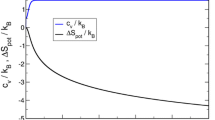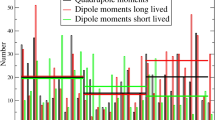Abstract
Recent work on the estimation of dipole moments in solution, particularly by Müller1 and Jenkins2, has shown that, contrary to that which was formerly believed, the apparent dipole moment of a substance in solution is not independent of the non-polar solvent in which it is measured, although in the case of each solvent the polarisations of the solute are extrapolated to infinite dilution. The apparent dipole moment decreases as the dielectric constant of the solvent increases. As a further consequence of this effect, the temperature variation of the polarisation at infinite dilution in a given solvent leads to a value of the moment which is too low, since the dielectric constant of the solvent decreases as the temperature rises.
Similar content being viewed by others
References
Müller, Phys. Z., 33, 732; 1932. 34, 689; 1933. 35, 346; 1934.
Jenkins, NATURE, 133, 106, Jan. 20, 1934. J. Chem. Soc., 480; 1934.
Sugden, NATURE, 133, 415, March 17, 1934.
sugden and Groves, J. Chem. Soc., 1094; 1934.
Author information
Authors and Affiliations
Rights and permissions
About this article
Cite this article
FAIRBROTHER, F. Determination of Dipole Moments in Solution. Nature 134, 458–459 (1934). https://doi.org/10.1038/134458b0
Issue Date:
DOI: https://doi.org/10.1038/134458b0
- Springer Nature Limited





